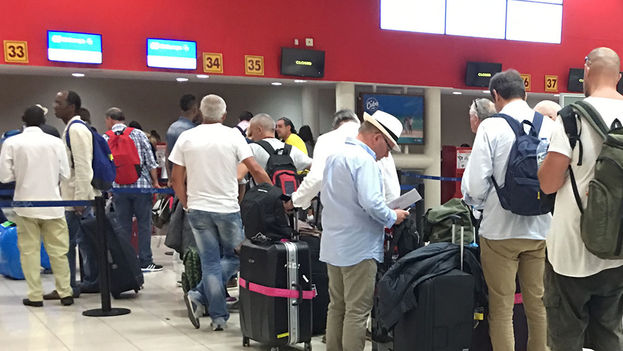
![]() 14ymedio, Marcelo Hernandez, Havana, 21 December 2016 – Walking around the block with a suitcase in hand has been added to the rituals to mark the end of the year, as a plea to be able to travel outside the country. Many Cubans fear, however, that the situation is becoming complicated with the pending arrival of Donald Trump to the White House.
14ymedio, Marcelo Hernandez, Havana, 21 December 2016 – Walking around the block with a suitcase in hand has been added to the rituals to mark the end of the year, as a plea to be able to travel outside the country. Many Cubans fear, however, that the situation is becoming complicated with the pending arrival of Donald Trump to the White House.
The president-elect of the United States has been so contradictory in his declarations about Cuba that no one knows what will happen between the two countries when he is installed in the Oval Office. Cubans on the island seem less concerned about a possible setback in the diplomatic thaw, than about the loss of their immigration privileges.
The debate over the repeal of the Cuban Adjustment Act, which awards benefits to migrant Cubans arriving in the United States, could put an end to the dreams of many in the new year. Foreign consulates in Havana, especially those of Latin American and European countries, have seen a surge in visa applications.
“We are overworked,” the custodian of the Mexican consulate site in the Miramar neighborhood told 14ymedio. Outside the building, Roberto, who prefers not to give his last name, managed to get a temporary visa to travel to the land of the Aztecs. This Thursday he will fly to Cancun, the cheapest flight between the two countries. “I’m working against the clock,” he says, while finishing the bureaucratic paperwork before the journey.
Roberto has a long journey ahead of him, plagued with obstacles and dangers to reach the US border, but he feels confident. “My brother who lives in Miami is going to help me and pay for the whole trip,” he explains. “It will be much more expensive, but I have to get there before January 20th,” he says.
Trump’s inauguration date has become the goal in a marathon race for thousands of Cubans. People who in recent months have liquidated their possessions, managed to get a visa and are preparing to leave.
Most consulates close their doors at the end of December for the Christmas holidays, an element that contributes to the desperation.
Departures by raft have also increased. The US Coast Guard recently reported that since last October 1st, the beginning of the fiscal year, around 1,000 Cubans have tried to enter the US illegally by sea. For fiscal year 2016, which ended on 30 September, the figure reached 7,411, compared to 4,473 for the same period in 2015.
With this exceptional winter, without cold and with an ocean free of hurricanes, many Cubans embark on the route to Florida in makeshift crafts. Raul Castro’s government has redoubled its vigilance along the coast lately, but the rafters choose to leave from remote places, among the mangroves or the rocks.
“I don’t know if Trump will be good for us or not, but I’m not going to stay here to find out,” says Yusmila Arcina, who worked as an accountant for a state company until she decided to “make the leap.” The young woman considers herself fortunate, in part, for having obtained a work visa for the Schengen Area (a free movement zone made up of most of the EU countries and others in the area). From Europe, where she expects it will be easier, she hopes to get a tourist visa to travel to the US, using the old continent as a springboard to realize her “American Dream.”
“Yes or no, we have to take advantage now,” suggests the young women, who has no family in the United States. Arcina has paid for the paperwork and a plane ticket in the high season, which cost her around 2,000 Convertible Cuban pesos (roughly the same in dollars), with the sale of a mid 20th century Cadillac that belonged to her father. “That car has been my ticket to freedom,” she jokes.
Arcina’s boyfriend is stranded in Colombia waiting to take the route through the Darien Gap. The challenge for both of them is to reach US territory “before that millionaire gets into office.” Both hope “to watch the inauguration ceremony on local TV in Miami,” says Arcina. Trump has fired the starting gun, and each one, on their own side, has embarked on their migration journey.
